Joni Mitchell, pilgrimage, wilderness: daylight savings and the Appalachian Trail, 4.2.06
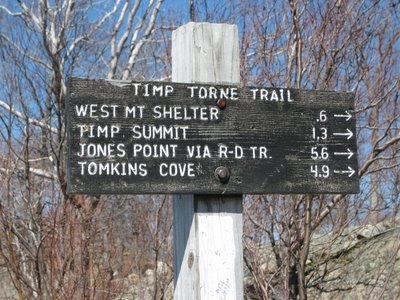 by Charlotte Deaver
by Charlotte DeaverYesterday I hiked for about six hours in the Bear Mountain State Park, spending most of my time on the Appalachian Trail while I pretended I was on a pilgrimage, which in a sense I was. I had been listening to Joni Mitchell's Hejira in the car on the way up Palisades Parkway.
"I'm traveling in some vehicle . . . porous with travel fever."
If I had high hopes for the inward and spiritual journey I would be taking along these trails, those hopes were soon replaced with such practical matters as huffing, puffing, slipping, falling, nose-blowing, direction-finding, and leg-trembling. I got lost, oh, at least twice, making my trek three hours longer than I knew this shapeless self was physically capable of.
Naturally, I cannot walk today. In fact, I will probably do no walking for several days.
But back to Joni. There is no way, being alone in the wilderness for that many hours, not to get a little reflective (I mean, look what happened to Jesus, although I prefer to imagine Dante's lost fugitive soul: "Midway in our life's journey I went astray/ from the straight road and woke to find myself/ alone in a dark wood." The Inferno, Canto I).
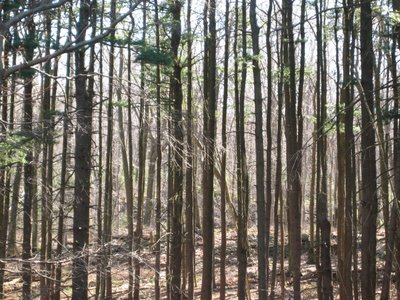
I was too happy, though, for melancholy, too invigorated for sober, personal inventory. I just kept walking. And when I realized I had strayed, I laughed (while my thighs, of course, cried). Had the paths been less steep and slippery (they were covered in last Fall's dead leaves), a six hour walk would not have been so debilitating. But I encountered mountain after mountain (okay, but they ARE called mountains), to the point of exhaustion. When I realized I was another two hours away from where my car was parked, Dante came to mind again: "I found myself before a little hill/ and lifted up my eyes. Its shoulders glowed . . . And there I lay to rest from my heart's race/ till calm and breath returned to me. Then rose/ and pushed up that dead slope at such a pace/ each footfall rose above the last."
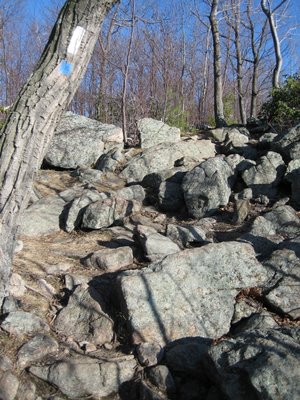
I would rather have imagined the robust and visionary Wordsworth ascending Mount Snowdon: "With forehead bent/ Earthward, as if in opposition set/ Against the enemy, I panted up/ With eager pace, and no less eager thoughts." He cruises up that mountain (a true mountain, mind you) and is immediately rewarded with a f*@k%ng vision: mist and moonlight that transform into an experience of the sublime:
". . . a blue chasm, a fracture in the vapour,
A deep and gloomy breathing-place, through which
Mounted the roar of waters, torrents, streams
Innumberable, roaring with one voice.
The universal spectacle throughout
Was shaped for admiration and delight,
Grand in itself alone, but in that breach
Through which the homeless voice of waters rose,
That dark deep thoroughfare, had Nature lodged
The soul, the imagination of the whole." (The Prelude, Book Fourteenth)
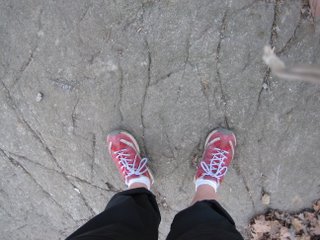
What did I get at the top, finally, of my hill? Some guy, sitting on a rock with his guitar, bellowing out Radiohead's "I'm A Creep."
I liked it, though. At least it wasn't a John Denver song. I've never identified with Wordsworth, anyway -- only worshipped/cherished/swooned over his poetry, while resenting him for his perfect psychic and physical health. Radiohead and I, on the other hand, have a lot in common.
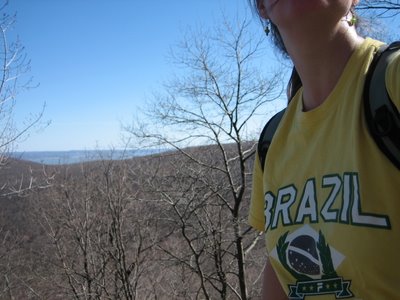
But back to Joni, with whom I identify the most. I love Hejira because of the way, along with being breathtaking musically (her voice! those chords!), it knocks metaphor against deep, personal revelation:
"I see something of myself in everyone
Just at this moment of the world
As snow gathers like bolts of lace
Waltzing on a ballroom girl . . .
You know it never has been easy
Whether you do or you do not resign
Whether you travel the breadth of extremities
Or stick to some straighter line . . .
I know - no one's going to show me everything
We all come and go unknown
Each so deep and superficial
Between the forceps and the stone
Well I looked at the granite markers
Those tribute to finality - to eternity
And then I looked at myself here
Chicken scratching for my immortality . . .
We're only particles of change I know, I know
Orbiting around the sun
But how can I have that point of view
When I'm always bound and tied to someone
White flags of winter chimneys
Waving truce against the moon
In the mirrors of a modern bank
From the window of a hotel room . . ."
And below, Saturday night, with map, preparing for pilgrimage:
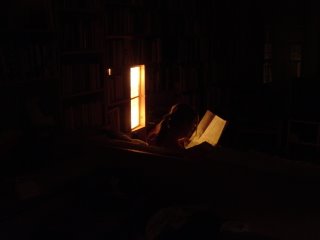


4 Comments:
This comment has been removed by a blog administrator.
It's always good to make such kind of journey, into the wilderness, even when you know your car is not to far (well, depending of your orientation...).
For me, as a muslim, is impossible not to link to the Hejira, when Muhammad (peace be upon him) left Mecca.
There's a book called "Muhammad: His Life Based on the Earliest Sources", and the moment when Muhammad (peace be upon him) leaves Mecca is really touching, because the sense of lost is so vivid and clear, a moment ot real truth.
The origin of the word "hejira" is from "departure" and "emigrate".
I wondered what the word hejira meant. Thank you. It makes sense, too, since the song is really more about fleeing, about departure, and barely becomes a kind of spiritual journey fleetingly and secularly.You have also reminded me that I must read more about Mohammad. I will look at the book you cite. Cheers. . .
"Muhammad: His Life Based on the Earliest Sources" by Martin Lings it's a good book, perhaps a little "heavy" for the great amount of names, but if you can pass the slow start and get into the story, well, is really a delight. It's not a religious book, it's more a historic one.
Post a Comment
<< Home 1aa3